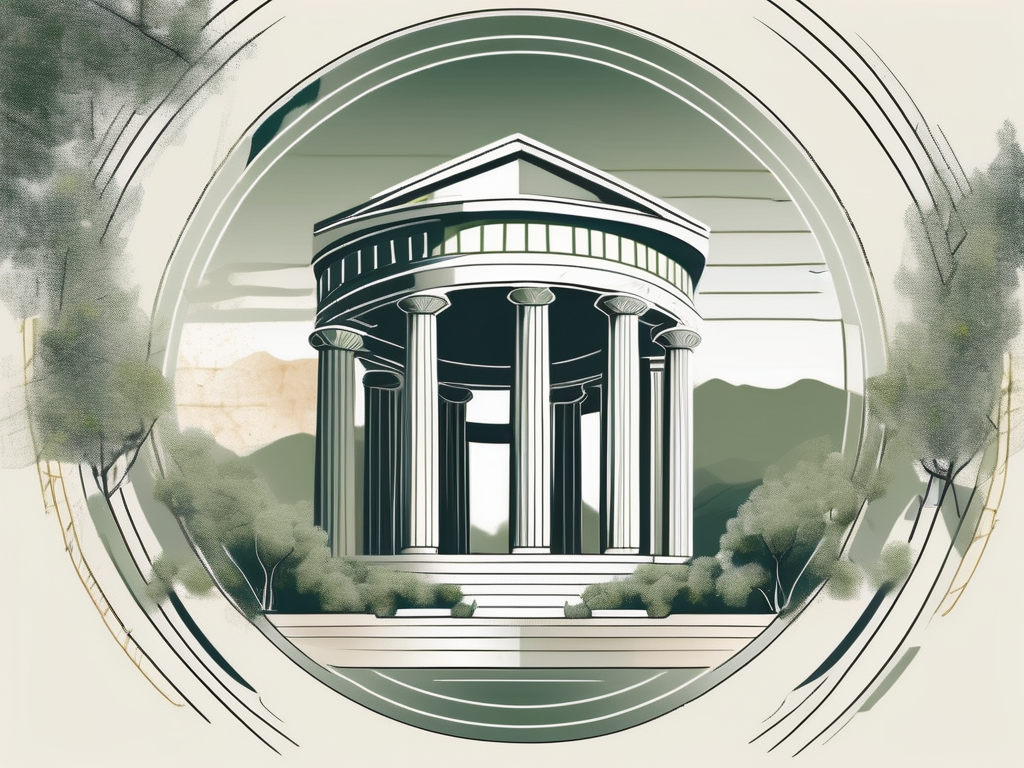Have you ever wondered what it means to live a good life? How can we navigate the challenges and uncertainties that come our way? Stoicism philosophy offers valuable insights into these questions, providing a framework for living with wisdom, resilience, and tranquility. In this article, we will explore the origins of Stoicism, its core principles, its approach to emotions, its relevance in modern life, and some criticisms and limitations. Let’s dive in and uncover the wisdom of Stoicism philosophy.
The Origins of Stoicism
Stoicism traces its roots back to ancient Greece, where it was founded by a man named Zeno of Citium around 300 BCE. Zeno, a student of philosophy, was influenced by various philosophical schools of thought, including Cynicism and Socratic philosophy. However, it was the Stoics who truly embraced Zeno’s ideas and developed them into a comprehensive philosophy of life.
The Stoics believed in the importance of virtue, reason, and self-control. They emphasized the need to live in harmony with nature and to accept the things that are beyond our control. Stoicism provided individuals with a practical framework for living a meaningful and fulfilling life.
Key Figures in Stoicism’s Development
Among the key figures in the development of Stoicism were Cleanthes, Chrysippus, and Seneca. Cleanthes, a student of Zeno, succeeded him as the head of the Stoic school. He played a crucial role in systematizing and formalizing the teachings of Stoicism, ensuring its continuity and growth.
Chrysippus, often referred to as the second founder of Stoicism, further expanded and refined the philosophy. He was known for his logical and systematic approach, contributing to the development of Stoic ethics, physics, and logic.
Seneca, a Roman philosopher, provided practical wisdom and guidance on how to live a virtuous life. His writings, including letters and essays, offered valuable insights into Stoic principles and their application in daily life. Seneca’s teachings resonated with many individuals, both in ancient Rome and throughout history.
Historical Context of Stoicism
Stoicism emerged during a time of political upheaval and uncertainty in ancient Greece and later in Rome. The Greek city-states were constantly engaged in conflicts, and the Roman Empire faced numerous challenges, including wars and political instability.
Stoicism offered individuals a way to navigate the challenges of life and find inner peace amidst external turmoil. It provided a sense of stability and resilience in the face of adversity. Stoic teachings emphasized the importance of focusing on what is within our control, rather than being consumed by external circumstances.
Stoicism gained popularity during the Roman Empire, attracting influential followers such as the Roman emperor Marcus Aurelius. Aurelius, known for his philosophical reflections in his book “Meditations,” embraced Stoic principles and applied them to his role as a ruler.
Throughout history, Stoicism has continued to inspire individuals seeking guidance on how to live a meaningful life. Its teachings have resonated with people from various walks of life, offering timeless wisdom and practical tools for personal growth and self-improvement.
Core Principles of Stoicism
The essence of Stoicism lies in its core principles, which guide individuals towards living a virtuous life and finding inner tranquility. Let’s explore a few of these principles.
The Principle of Acceptance
Stoicism teaches us to accept the things we cannot control and focus instead on what is within our power. This principle encourages us to let go of our attachments to external outcomes and accept life as it presents itself. By doing so, we free ourselves from unnecessary suffering and find peace within.
When we practice acceptance, we acknowledge that life is filled with both joys and sorrows. We understand that certain events are beyond our influence, such as the weather or the actions of others. Instead of resisting or fighting against these uncontrollable factors, Stoicism teaches us to embrace them with equanimity. By accepting the reality of our circumstances, we can redirect our energy towards what truly matters – our thoughts, actions, and attitudes.
Acceptance does not imply passivity or resignation. Rather, it empowers us to respond to life’s challenges with grace and resilience. We learn to adapt to changing circumstances and find creative solutions to problems. By accepting the present moment, we can fully engage with life and make the most of every opportunity.
The Concept of Virtue in Stoicism
Virtue, according to Stoicism, is the highest good and the ultimate goal of life. Stoics believe that living virtuously is the key to living a good life. Virtue encompasses qualities such as wisdom, courage, justice, and temperance. By cultivating these virtues, we strive to align our actions with moral excellence.
Wisdom is the foundation of virtue in Stoicism. It involves seeking knowledge, understanding the nature of reality, and applying reason to our thoughts and actions. By cultivating wisdom, we gain insight into what is truly important and make informed decisions that align with our values.
Courage is another essential virtue in Stoicism. It is not just about physical bravery but also about facing our fears, standing up for what is right, and taking action in the face of adversity. Stoics believe that true courage comes from within and is rooted in our commitment to living a virtuous life.
Justice is the virtue of treating others with fairness, respect, and compassion. Stoics emphasize the importance of recognizing the inherent worth and dignity of every individual. By practicing justice, we contribute to the well-being of society and create harmonious relationships based on mutual respect.
Temperance, the final virtue in Stoicism, involves practicing self-control and moderation. It is about finding balance in our desires and actions, avoiding excess and indulgence. By cultivating temperance, we develop discipline and avoid being driven by our impulses or external circumstances.
Understanding the Dichotomy of Control
Stoicism distinguishes between things that are within our control and those that are not. We have control over our thoughts, actions, and attitudes, but we have no control over external events or the actions of others. By focusing on what we can control and accepting what we cannot, we free ourselves from frustration and find serenity.
This principle reminds us that our power lies in how we choose to respond to the events and circumstances of life. While we may not be able to control the outcome, we can control our mindset and the actions we take. Stoicism teaches us to focus on our internal state rather than being consumed by external factors beyond our influence.
By understanding the dichotomy of control, we become more resilient and adaptable. We let go of the need to control everything and instead focus on developing our character and living in accordance with our values. This shift in perspective allows us to navigate life’s challenges with greater ease and find peace amidst chaos.
Ultimately, Stoicism offers a practical philosophy for living a meaningful and fulfilling life. By embracing acceptance, cultivating virtue, and understanding the dichotomy of control, we can find inner tranquility and live in alignment with our highest values.
Stoicism and Emotion
One of the distinguishing aspects of Stoicism is its view on emotions. Stoics believe that emotions are not to be suppressed or eliminated but rather understood and guided. Let’s explore how Stoicism approaches negative emotions and the pursuit of tranquility.
Stoicism, an ancient philosophy founded in Athens by Zeno of Citium, offers a unique perspective on the human experience. It teaches us that emotions are not inherently good or bad but rather neutral responses to external events. Stoics argue that it is our judgments and interpretations of these events that determine the quality of our emotions.
The Stoic Approach to Negative Emotions
Stoics recognize that negative emotions, such as anger, fear, and sadness, are a natural part of being human. Instead of trying to suppress or avoid these emotions, Stoicism encourages us to examine their underlying causes and question the validity of our judgments. By developing emotional resilience, we become better equipped to face challenges with equanimity.
Imagine a scenario where someone cuts you off in traffic, causing you to feel a surge of anger. According to Stoic principles, the anger you experience is not inherently caused by the other driver’s actions but rather by your interpretation of the event. By questioning whether your anger is justified or if there might be alternative explanations for the driver’s behavior, you can begin to shift your perspective and manage your emotions more effectively.
Stoicism teaches us that negative emotions can be transformed into opportunities for growth and self-improvement. By examining our judgments and challenging our initial emotional responses, we can cultivate a more balanced and rational mindset.
Stoicism and the Pursuit of Tranquility
Central to Stoicism is the pursuit of tranquility, also known as “ataraxia.” Stoics believe that true happiness and peace of mind come from cultivating an inner state of tranquility, regardless of external circumstances. By practicing acceptance, focusing on virtue, and managing our emotions, we can attain a state of inner calm amidst the chaos of life.
Stoics emphasize the importance of accepting the things we cannot control and focusing our energy on the things we can. This mindset shift allows us to let go of unnecessary worries and anxieties, freeing up mental space for more productive and fulfilling pursuits.
Furthermore, Stoicism teaches us to prioritize virtue in our actions and decisions. By aligning our behavior with moral principles, we can cultivate a sense of integrity and purpose, which contributes to our overall sense of tranquility.
Managing our emotions is another crucial aspect of Stoic philosophy. Stoics advocate for developing emotional self-awareness and practicing emotional regulation techniques. By acknowledging our emotions without being consumed by them, we can maintain a sense of inner calm and respond to challenging situations with clarity and wisdom.
In conclusion, Stoicism offers a profound perspective on emotions and the pursuit of tranquility. By understanding and guiding our emotions, we can cultivate emotional resilience and achieve a state of inner calm. Through acceptance, virtue, and emotional management, Stoicism provides a practical framework for finding peace of mind amidst the complexities of life.
Stoicism in Modern Life
Although Stoicism originated in ancient times, its principles remain highly relevant and applicable to modern life. Let’s explore how we can apply Stoic philosophy in our everyday lives and its impact on mental health.
Stoicism, a philosophy that dates back to ancient Greece, has stood the test of time and continues to offer valuable insights for navigating the complexities of modern life. Its core principles, which emphasize acceptance, mindfulness, and focusing on what is within our control, provide a practical framework for making daily choices and dealing with life’s challenges.
One of the key tenets of Stoicism is the practice of acceptance. By accepting the things we cannot change and focusing our energy on what we can control, we can cultivate resilience and find greater peace in our daily lives. This doesn’t mean that we should passively accept everything that comes our way, but rather that we should approach situations with a sense of equanimity and a willingness to adapt.
In addition to acceptance, Stoicism encourages us to be mindful of our judgments. Often, our negative emotions and reactions stem from our own internal judgments about a situation. By becoming aware of these judgments and questioning their validity, we can gain a more objective perspective and avoid unnecessary suffering.
Stoic practices such as meditation, journaling, and reflecting on philosophical texts can also deepen our understanding and application of these principles. Meditation, for example, helps us cultivate mindfulness and develop a greater awareness of our thoughts and emotions. Journaling allows us to reflect on our experiences and gain insights into our own patterns of thinking and behavior. Engaging with philosophical texts, whether ancient or modern, provides us with a rich source of wisdom and guidance as we navigate the complexities of life.
Stoicism and Mental Health
The Stoic philosophy has gained recognition for its potential in enhancing mental well-being. In a world filled with constant distractions and external pressures, Stoicism offers a refreshing perspective that can help us find inner peace and balance.
By teaching us to focus on what we can control and let go of external outcomes, Stoicism helps us avoid unnecessary stress and anxiety. It reminds us that our happiness should not be dependent on external circumstances, but rather on our own internal state of mind. This shift in perspective can be incredibly liberating and empowering.
Cultivating virtues such as wisdom and resilience is another important aspect of Stoicism that can contribute to improved emotional and psychological well-being. Wisdom, in the Stoic sense, involves developing a deep understanding of ourselves and the world around us. It allows us to make sound decisions and navigate life’s challenges with clarity and equanimity. Resilience, on the other hand, enables us to bounce back from setbacks and persevere in the face of adversity.
Stoicism is not about suppressing or denying our emotions, but rather about developing a healthy relationship with them. It encourages us to acknowledge and accept our emotions, while also recognizing that they are within our control. By practicing emotional resilience and cultivating a sense of inner calm, we can better manage stress, anxiety, and other mental health challenges.
In conclusion, Stoicism offers practical principles that can guide us in making daily choices and dealing with life’s challenges. Its emphasis on acceptance, mindfulness, and focusing on what is within our control provides a valuable framework for navigating the complexities of modern life. By applying Stoic philosophy in our everyday lives, we can cultivate resilience, find greater peace, and enhance our mental well-being.
Criticisms and Limitations of Stoicism
While Stoicism offers valuable insights, it is essential to acknowledge its criticisms and limitations. Let’s explore some common misconceptions about Stoicism and potential drawbacks of this philosophical school.
Common Misconceptions about Stoicism
One common misconception about Stoicism is that it promotes emotional detachment or indifference. Stoicism does not encourage the suppression of emotions but rather their wise management. Another misconception is that Stoicism advocates passivity in the face of injustice. Stoics value active engagement and strive to promote justice and fairness in society.
Potential Drawbacks of Stoic Philosophy
Stoicism, like any philosophy, may not resonate with everyone. Some individuals may find its emphasis on self-control and acceptance challenging to implement in practice. Others may feel that it downplays the importance of emotions or fails to address the complexities of human existence fully. It is essential to explore different philosophical perspectives and find what resonates with our own values and beliefs.
Conclusion
Stoicism philosophy offers timeless wisdom and practical guidance for living a good life. By understanding its origins, core principles, and approach to emotion, we can apply Stoic teachings to enhance our well-being and navigate the challenges that life presents. While acknowledging its limitations, Stoicism can serve as a valuable philosophical compass in our journey towards tranquility and virtue.












